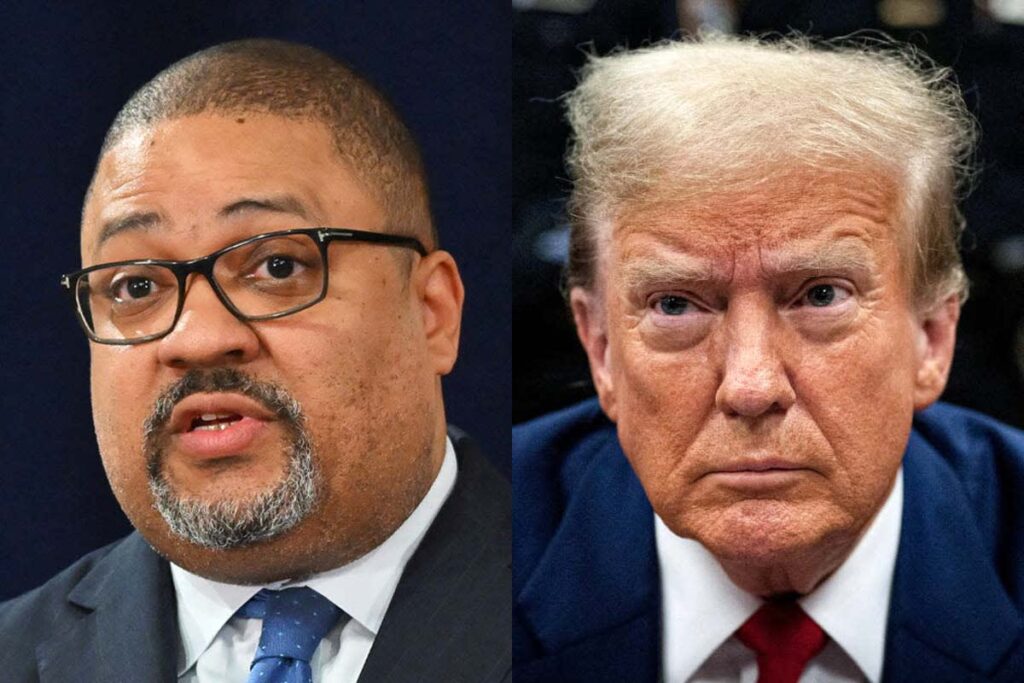It took a jury two days to find former President Donald Trump guilty of all 34 counts of first-degree falsifying business records, proving that Manhattan District Attorney Alvin Bragg's somewhat risky approach to prosecuting the hush money case was the right choice.
Shortly after Bragg's office filed its first indictment against Trump in April 2023, three more felony indictments were filed in three other jurisdictions: Florida, Georgia, and the District of Columbia. As the cases proceeded through the state and federal court systems, it was expected that Trump's Washington federal election interference lawsuit would go to trial before the others. So it came as a surprise to many when it was announced that Bragg's case would go to trial first. And it fast-tracked the (somewhat delayed) investigation into the New York election interference lawsuit.
What has raised eyebrows is the added element of “another crime.”
When the indictment was unsealed in April 2023, it revealed 34 felony counts of falsifying business records in the first degree, in violation of New York State Penal Code § 17-152. It is important to take a moment to understand what the prosecution had to prove beyond a reasonable doubt: that Trump made (or caused to be made) false statements in the business records of the companies with the intent to defraud, and that his “intent to defraud included the intent to commit, or to aid and abet the commission of, another crime.” What are the other crimes that the prosecution said Trump intended to commit, or to aid and abet the commission of? According to Assistant District Attorney Joshua Steinglass, it is New York State Election Law § 17-152: “Conspiracy to Promote or Obstruct an Election; Two or more persons conspire to promote or obstruct an election to public office by unlawful means.”
The Manhattan district attorney's office has prosecuted numerous cases of falsifying business records. These are typically simple, run-of-the-mill paperwork offenses. Bragg even calls them the “bread and butter” of his office's white-collar work. But it's the addition of the “other crime” element that has raised eyebrows. And this is the crux of the novel legal theory Bragg chose to employ in this case. The Washington Post searched the New York State Law Reporting Bureau going back to 2000 for relevant precedents on this particular law. The report found “two records in which judges issued legal opinions on the law,” both of which were in the New York State District Court. [Judge Juan] Last year's merchandising “Trump's motion to dismiss the case was denied” Section 17-152 is a rare prosecution in New York, which makes Bragg's decision to prosecute a former U.S. president primarily under that statute all the more novel.
Bragg is an experienced prosecutor. He graduated from Harvard Law School, clerked for federal judges, worked in the New York Attorney General's Office as the U.S. Attorney for the Southern District of New York, and was a law professor at New York Law School. During his time at the U.S. Attorney's Office, his cases included fraud, money laundering, and public corruption. He is no stranger to courtroom tactics, and he is no stranger to prosecuting Trump. He led the team at the Attorney General's Office that successfully prosecuted the Trump Foundation, which was dissolved and Trump was forced to pay $2 million in restitution.
Bragg was educated and naive enough to prosecute Trump, and smart enough to see the true nature of the case: “This is not about money for sex. This is about a conspiracy to rig a presidential election,” he declared in an interview with WNYC.
As you may recall, Blagg's predecessor, Cyrus Vance Jr., began investigating Trump in 2019. Vance said his investigation began at roughly the same time as the Southern District of New York investigation. In fact, Vance said he was told by the SDNY to stop the investigation and did so for over a year. Vance ultimately decided not to prosecute Trump or his associates for any crimes, in part due to concerns over “emerging issues regarding the use of false statement statutes in connection with committing crimes that violate federal election law.” In July 2021, Vance indicted former CFO of the Trump Organization, Allen Weisselberg, Trump Corporation (doing business as The Trump Organization), and Trump Payroll Corporation (doing business as The Trump Organization) for criminal tax evasion, grand theft, and first-degree falsification of business records, among other crimes. The prosecution resulted in Weisselberg pleading guilty to perjury and the remaining defendants being convicted after trial.
Bragg himself initially expressed doubts about pursuing charges.
Bragg himself initially expressed doubts about the prosecution. The two lead prosecutors whom Vance had brought in to investigate Trump and who stayed on after Bragg took over, Cary Dunn and Mark Pomerantz, suddenly resigned in early 2022. In his publicly released resignation letter, Pomerantz harshly criticized Bragg for his inaction. In his resignation letter, he said he believed Trump had “committed numerous felonies” and that Bragg's decision not to prosecute Trump was “against the public interest.” Thirteen months later, Trump was indicted by Bragg.
The inside story of prosecuting a case is that even if the facts meet all the elements of a crime and there is good cause to prosecute, other factors are not necessarily considered before deciding whether to move forward with the case. That calculation includes the likelihood of a jury victory. In this case, Bragg and his prosecution team must have considered whether the jury was likely to return a not guilty verdict, whether the jury would understand the prosecution's theory and be interested enough in the case. Now that a guilty verdict has been handed down, I think we know the answer.

